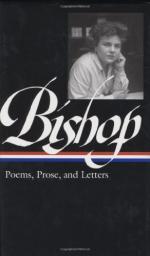|
This section contains 458 words (approx. 2 pages at 300 words per page) |

|
[The essay from which this excerpt is taken originally appeared in The New Republic, November 10, 1979.]
In Elizabeth Bishop's bizarre, sly, deceptively plainspoken late poem "Crusoe in England," the famous solitary looks back on his life near its end, recalling his isolation and rescue in ways deeper and more unsettling than Defoe could have dreamed. After painting the hallucinatory, vivid island, with hissing volcanoes and hissing giant turtles—an unforgettable terrain—Bishop's Crusoe muses on the dried-out, wan relics of a life. It's tempting, after Elizabeth Bishop's sudden death a few weeks ago, to understand that passage as a master-artist's commentary on the mere furniture of personality and biography—the facts, the manuscripts, the ups and downs of public reputation…. In the perspective of loss, and actual feeling, artifacts and art can seem withered remnants. In their modesty of outward manner, and their immensely proud awareness of their own...
|
This section contains 458 words (approx. 2 pages at 300 words per page) |

|


